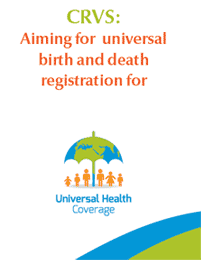Civil registration systems are used to record vital events, including births, deaths, and marriages. They have the potential to serve as the main source of national vital statistics. However, in many developing countries, civil registration and vital statistics systems are weak or nonexistent; as a result, key demographic, fertility and mortality statistics are not available on a continuous basis and do not cover large segments of the population.
SCORE Assessment 2019 country fact sheets
Health information system comprehensive assessment
Comprehensive assessment of Iraq’s health information system 2019
Comprehensive assessment of Pakistan’s health information system 2017
Comprehensive assessment of Pakistan’s health information system 2017
Comprehensive assessment of Jordan’s health information system 2016
Comprehensive assessment of Afghanistan’s health information system 2018










